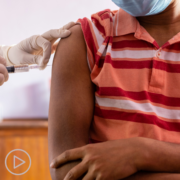Prostate Cancer Screening and Outcomes | Impact of Racial Disparities
Prostate Cancer Screening and Outcomes | Impact of Racial Disparities from Patient Empowerment Network on Vimeo.
What do prostate cancer screening and outcomes data show about racial disparities? Expert Dr. Yaw Nyame with the University of Washington shares research data about screening and treatment outcomes for Black populations and the importance of early detection.
See More from [ACT]IVATED Prostate Cancer
Related Resources:

Understanding the Role of a Digital Rectal Exam in Prostate Cancer Care |

|

Advanced Prostate Cancer Clinical Trials | Why Black and Latinx Participation Is Vital |
Transcript:
Lisa:
So, Dr. Nyame, are there racial or ethnic differences in the incidence, screening outcomes, and/or treatment of prostate cancer. And can you talk about those a bit.
Dr. Yaw Nyame:
About prostate cancer demonstrates the widest racial disparity of any cancer in the United States. Black men are more likely to be diagnosed with prostate cancer, about 60 percent to 80 percent more likely, and they are more than twice as likely to die from prostate cancer compared to the average U.S. population.
When it comes to data on screening and treatment, there’s mixed data available of differing quality, but what I would say is that Black individuals, Black prostate cancer patients seem to be less likely to receive definitive treatments or treatments that can offer cure, and they’re less likely to have screening performed and perform a PSA testing, and I think a lot of the outcomes that we see reflect that lower use of early detection, finding cancers early through PSA testing, which is a blood test and lower utilization of treatment for when people are diagnosed with curable cancers is a really complex topic that I could talk about for a really, really long time, but suffice it to say that Black populations have among the worst outcomes of any cancer, when we look within prostate cancer and we know that other populations that have social disadvantages also can have worse prostate cancer outcomes as a result of the social determinants of health and other structural determinants of equity. When it comes to racial disparities and prostate cancer my activation tip is to be knowledgeable and aware.
Be knowledgeable and aware of what’s happening in your community with regards to prostate cancer and what’s happening in your family, because family histories are really important, not just to prostate cancer, but all cancers that may run in the family, because I think the first step is understanding what your individual risk is. And then that allows you to then make plans and educate yourself around things like, well, I do PSA screening to try and get my cancer detected early, if I’m at high risk, should I get treatment if I am diagnosed? And all the other things that come downstream. So really the awareness is absolutely critical, and I think having conversations that don’t seem like routine family dinner conversations, like, did grandpa have prostate cancer? Those are things that we need to normalize.










